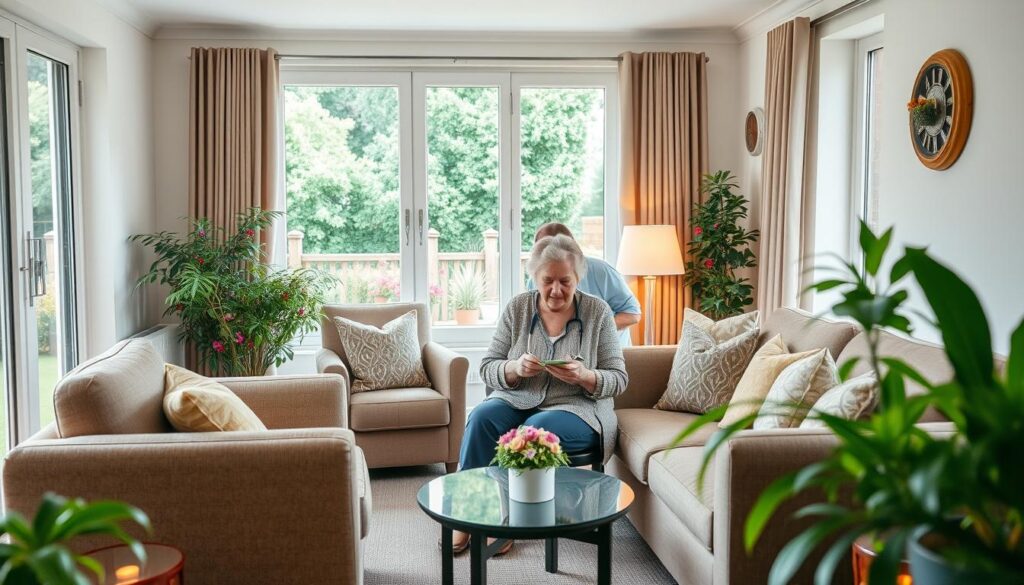Did you know 90% of adults over 65 want to stay in their homes as they age? This shows the need for senior home care solutions. Families are looking for ways to help their elderly loved ones stay independent and happy at home.
Keka rehab services have been helping. They offer services to keep seniors active and engaged in their homes. They provide daily help and special care for those with Alzheimer’s and dementia, meeting each person’s needs.
They also have a 24/7 digital monitoring service for safety and peace of mind. This service is backed by professional caregivers who get ongoing training and background checks.
For those with dementia, they have a special program called Positive Approach to Care (PAC). It was created by Teepa Snow, a dementia care expert. This program teaches caregivers how to care for dementia patients effectively and with compassion.
Key Takeaways:
- 90% of seniors prefer ageing in place
- Comprehensive services for daily living and specialized care
- 24/7 digital monitoring for safety
- Positive Approach to Care training for dementia support
- Professional caregivers with ongoing training
- Personalized care plans to meet individual needs
Understanding the Need for Senior Home Care
As more people get older, the need for senior care grows. Many seniors want to stay in their homes. This has led to a rise in aging in place services.
The Growing Demand for Aging in Place Services
After 65, most people need some care. Ageing in-place services help them stay independent and happy. These services include transportation, home changes, personal care, and health care from experts like nurses.
Home health aides are key in giving personalized care. They can help a few hours a day or live with the person. It’s smart to plan for ageing in place early, as care needs can change over time.
Benefits of Home Care for Seniors and Families
Ageing in place has many benefits for seniors and their families. It lets seniors stay independent while getting the help they need. Home care can help with:
- Personal care
- Household chores
- Meal preparation
- Money management
- Health care
- Transportation
- Safety measures
Families feel less stressed and have peace of mind knowing their loved ones are cared for at home. Home care costs vary, but there are funding options like personal funds, government programs, and insurance.
Comprehensive Senior Home Care Solutions
Senior home care offers many services to meet individual needs. It includes help with daily tasks, support during recovery, and companionship for the ageing. These services can be for a few hours a day or all day, based on what your loved one needs.
Experienced caregivers help with personal care, cooking, cleaning, and reminding about medication. They also take seniors to doctor’s appointments. They offer companionship and help with activities, keeping seniors independent and happy.
In Boston MA and nearby, home care is tailored to each person’s needs. Caregivers are trained to meet specific needs and manage care effectively. Caregivers provide emotional support, social interaction, and help with daily tasks. This lets seniors stay in their homes comfortably.
- Personal care assistance
- Meal planning and preparation
- Light housekeeping and laundry
- Companionship and engagement
- Medication reminders
- Transportation services
Some agencies use technology to keep seniors safe at home. For example, SmartCare uses sensors to send alerts for changes in routine. This helps older adults stay safe and independent in their homes. This all-around approach ensures seniors get the support they need to age in place.
Personalized Care Plans for Elderly Loved Ones
Creating tailored care plans is key for seniors who want to stay in their homes. These plans meet their unique needs and wishes. This way, they can stay comfortable and independent in their own space.
Assessing Individual Needs and Preferences
A detailed assessment is the first step in personalized in-home care for seniors. It looks at their physical, emotional, and social needs. This approach helps seniors feel better emotionally because they’re in their own home.
Tailoring Services to Match Specific Requirements
Personal care for seniors varies based on their needs. Some need help with daily tasks, while others require dementia care. Custom plans include activities to keep them independent and mentally sharp.
Flexibility in Care Schedules
Care plans can change as needs do, offering flexibility from a few hours a week to full-time care. This flexibility ensures seniors get the right care at the right time. Personalized home care can also lower hospital visits and healthcare costs for families.
Regular checks and updates to care plans are vital as seniors’ needs change. This keeps their quality of life high and involves families in their care. Personalized care plans help seniors age with dignity in their own homes.
Professional Caregivers: The Backbone of Home Care
Professional caregivers are key in providing quality care for the elderly at home. They get special training in senior care, like helping with daily tasks and preventing falls. Their skills help seniors get the best care in their own homes.
Caregivers need empathy, patience, and flexibility to care for seniors with different needs. They use visual cues, touch, and body language to communicate well. This is especially important for those with dementia or other cognitive issues.
The range of services for seniors is wide. It includes skilled nursing, physical therapy, and speech-language pathology. Home health aides help with bathing, dressing, and cooking. They also offer emotional support and friendship.
Caregivers have many career paths to follow. They can move from home care to hospice, assisted living, or hospitals. They need to keep learning and improving their skills.
The trend towards home-based care is growing. It shows more people want to age in their own homes. This makes skilled home health aides even more vital in supporting seniors’ independence and quality of life.
Specialized Care for Dementia and Alzheimer’s Patients
Dementia care at home needs a personal touch. As the disease gets worse, special care is key for safety and comfort. Solutions for Alzheimer’s often mix professional help with supportive settings.
Positive Approach to Care Training
Caregivers learn the Positive Approach to Care (PAC) method. They use patients’ skills and offer support. This training helps them deal with memory issues, making care at home kind and effective.
Creating a Safe and Supportive Environment
Creating a safe home is vital for Alzheimer’s care. It means removing dangers, adding safety features, and organizing spaces. This helps prevent confusion and keeps patients safe.
Engaging Activities for Cognitive Stimulation
Activities that challenge the brain are important for Alzheimer’s patients. Caregivers with dementia expertise offer creative ways to keep patients engaged. These activities match their abilities and help keep their minds sharp.
As dementia advances, care needs to change. Early-stage patients might do well in assisted living, while advanced cases need memory care units. Talking to a geriatric care manager can help find the right care for your loved one.
Supporting Family Caregivers with Respite Care
Caring for elderly loved ones at home is rewarding but also challenging. Over 40 million Americans give unpaid elder care, showing the need for respite care for family caregivers. This service gives a temporary break, letting primary caregivers work, do personal tasks, and spend time with family.

Respite care is key in preventing caregiver burnout. It gives a much-needed break from the stress and emotional strain of caregiving. Home care agencies offer help with bathing, dressing, and meal planning, giving caregivers time to rest.
Respite care is flexible, fitting the needs of families caring for the elderly at home. Services can last from a few hours to overnight or longer. There are also fast-track options for immediate needs, ensuring support when it’s most needed.
Caregiver Support Program offers many services. These include respite care, benefits counselling, education, and help with caregiving expenses. The program helps caregivers aged 18 and over care for those 60 and older or with cognitive disorders.
Enhancing Quality of Life through Companionship and Social Engagement
Senior home care is more than just help with daily tasks. It aims to make life better for older adults. Companion care is key in this effort.
Reducing Isolation and Loneliness
Many seniors feel lonely after they retire. This can cause anxiety and depression. Companion care fights these feelings by offering friendship and support.
Encouraging Participation in Hobbies and Interests
Senior care includes activities that keep older adults active. Caregivers help them enjoy hobbies and interests. This keeps their minds sharp and lifts their spirits.
Facilitating Community Connections
Companion care helps seniors stay in touch with their community. They get help with rides, outings, and using technology. This keeps them connected with loved ones.
Professional in-home care offers a complete approach to senior well-being. It improves physical health, and emotional stability, and eases the burden on family caregivers. By focusing on social interaction, senior care helps older adults live more satisfying lives.
Ensuring Safety and Independence at Home
Aging in-place services focus on keeping seniors safe and independent. They use fall prevention and home changes to make living safer. Seniors get 24/7 monitoring and help with daily tasks to lower accident risks.

Research links independence to a better life for seniors. Many seniors want to stay independent, and technology helps a lot. The U.S. Census Bureau predicts a big increase in seniors by 2060, making home care even more crucial.
Caregivers trained in aging in place services help seniors stay safe and independent. They provide personal care, help with moving, and prepare meals. Open talks between seniors, families, and caregivers help meet everyone’s needs and wishes.
In-home assistance for seniors includes:
- Light housekeeping tasks
- Medication reminders
- Transportation assistance
- Companionship to combat social isolation
These services help seniors live at home and enjoy life. Regular care plan reviews keep things up to date, ensuring safety and independence.
The Cost-Effectiveness of Senior Home Care Solutions
Senior home care is a budget-friendly choice compared to nursing homes. The cost in 2024 is $30 per hour, with prices changing based on the agency and location. This makes it easier for families to adjust care to fit their budget.
Comparing Home Care to Institutional Options
Home care is usually cheaper than nursing homes or assisted living. Nursing homes cost between $8,000-$9,500 a month. In contrast, in-home care for 30 hours a week costs about $3,900 a month.
Insurance and Payment Options
There are many ways to pay for elderly care at home. Long-term care insurance can help, and some may get help from state Medicaid or veteran’s benefits. Medicare covers things like injections, wound care, and therapy.
Long-Term Financial Planning for Home Care
It’s important to plan for long-term care. Costs depend on the care needed and where you live, with prices from $21 to $50 an hour. Some agencies offer lower rates for regular care or more hours a week. Looking into all options helps ensure your loved ones get the care they need.
Conclusion: Empowering Seniors to Age with Dignity
Senior home care solutions empower older adults to live with dignity at home. These services are tailored to meet each person’s needs, boosting their well-being and independence. Seniors can keep control over their lives, feeling more engaged and purposeful.
These care options range from simple companionship to skilled nursing for conditions like Alzheimer’s. This wide range ensures seniors get the right care, improving their safety, nutrition, and emotional health.
As more people age, quality home care becomes even more crucial. It benefits seniors and gives families peace of mind. Home care helps seniors stay connected, active, and respected, preventing loneliness and keeping them healthy. It’s a caring, effective way for seniors to age in their own homes.
FAQ
What services do senior home care solutions provide?
Senior home care offers many services. These include daily living help, temporary support during recovery, and companionship. They also provide transportation, meal prep, light housekeeping, and manage medication.
How are care plans developed for seniors?
Care plans are made just for each senior. They’re based on a detailed look at what each person needs and wants. Services are chosen to fit their specific needs, like daily help or companionship. Plans are checked and updated as needs change.
What makes professional caregivers qualified for senior home care?
Professional caregivers get special training. They learn about daily living help, dementia care, and preventing falls. They also pass background checks and get ongoing training to give the best care and support.
How does senior home care address dementia and Alzheimer’s?
For dementia and Alzheimer’s, caregivers get special training. This includes the Positive Approach to Care (PAC) by Teepa Snow. It helps them use what seniors still can do and keeps them safe and engaged.
What is respite care, and how does it benefit family caregivers?
Respite care gives family caregivers a much-needed break. It lets them take time for themselves while knowing their loved ones are in good hands. This helps prevent burnout.
How does companionship care to enhance seniors’ quality of life?
Companionship care is key to a better life for seniors. Caregivers talk, do activities, and go on outings with them. This helps fight loneliness and keeps seniors active and happy.
How do senior home care solutions prioritize safety and independence?
Home care focuses on safety and keeping seniors independent. It includes preventing falls, making home changes, and using digital monitoring. Caregivers are trained to spot dangers and help seniors stay safe and independent.
Is senior home care cost-effective compared to institutional care?
Home care can be cheaper than nursing homes or assisted living. It lets seniors stay in their homes longer. Costs vary, but many find it more affordable and flexible.








